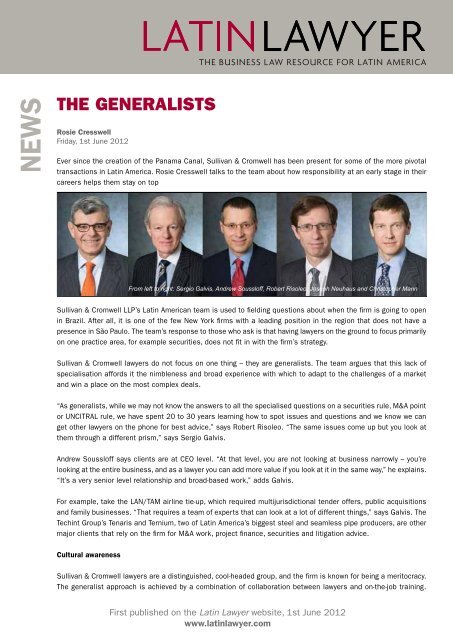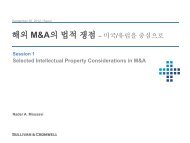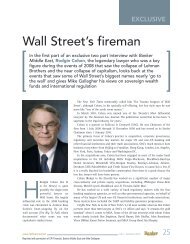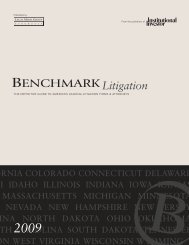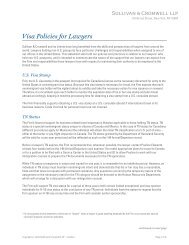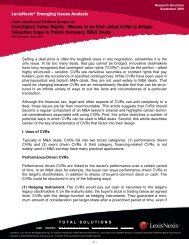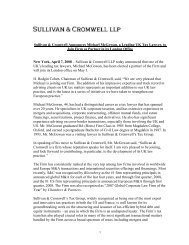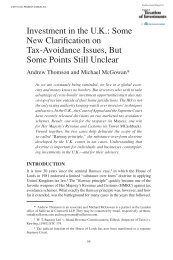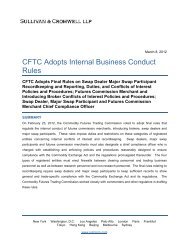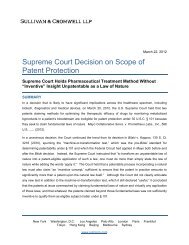THE GENERALISTS - Sullivan & Cromwell
THE GENERALISTS - Sullivan & Cromwell
THE GENERALISTS - Sullivan & Cromwell
You also want an ePaper? Increase the reach of your titles
YUMPU automatically turns print PDFs into web optimized ePapers that Google loves.
news<br />
The generalisTs<br />
Rosie Cresswell<br />
Friday, 1st June 2012<br />
Ever since the creation of the Panama Canal, <strong>Sullivan</strong> & <strong>Cromwell</strong> has been present for some of the more pivotal<br />
transactions in Latin America. Rosie Cresswell talks to the team about how responsibility at an early stage in their<br />
careers helps them stay on top<br />
<strong>Sullivan</strong> & <strong>Cromwell</strong> LLP’s Latin American team is used to fielding questions about when the firm is going to open<br />
in Brazil. After all, it is one of the few New York firms with a leading position in the region that does not have a<br />
presence in São Paulo. The team’s response to those who ask is that having lawyers on the ground to focus primarily<br />
on one practice area, for example securities, does not fit in with the firm’s strategy.<br />
<strong>Sullivan</strong> & <strong>Cromwell</strong> lawyers do not focus on one thing – they are generalists. The team argues that this lack of<br />
specialisation affords it the nimbleness and broad experience with which to adapt to the challenges of a market<br />
and win a place on the most complex deals.<br />
“As generalists, while we may not know the answers to all the specialised questions on a securities rule, M&A point<br />
or UNCITRAL rule, we have spent 20 to 30 years learning how to spot issues and questions and we know we can<br />
get other lawyers on the phone for best advice,” says Robert Risoleo. “The same issues come up but you look at<br />
them through a different prism,” says Sergio Galvis.<br />
Andrew Soussloff says clients are at CEO level. “At that level, you are not looking at business narrowly – you’re<br />
looking at the entire business, and as a lawyer you can add more value if you look at it in the same way,” he explains.<br />
“It’s a very senior level relationship and broad-based work,” adds Galvis.<br />
For example, take the LAN/TAM airline tie-up, which required multijurisdictional tender offers, public acquisitions<br />
and family businesses. “That requires a team of experts that can look at a lot of different things,” says Galvis. The<br />
Techint Group’s Tenaris and Ternium, two of Latin America’s biggest steel and seamless pipe producers, are other<br />
major clients that rely on the firm for M&A work, project finance, securities and litigation advice.<br />
Cultural awareness<br />
From left to right: Sergio Galvis, Andrew Soussloff, Robert Risoleo, Joseph Neuhaus and Christopher Mann<br />
<strong>Sullivan</strong> & <strong>Cromwell</strong> lawyers are a distinguished, cool-headed group, and the firm is known for being a meritocracy.<br />
The generalist approach is achieved by a combination of collaboration between lawyers and on-the-job training.<br />
First published on the Latin Lawyer website, 1st June 2012<br />
www.latinlawyer.com
news<br />
In addition, lawyers do not concentrate solely on Latin American work, which they argue differentiates them from<br />
other firms operating in the region. Risoleo notes that the benefit of not practising exclusively in Latin America is<br />
that they build a greater cultural awareness. “It’s very useful for someone in Latin America to have done work in<br />
Europe and the US to make sense of what’s going on,” he explains.<br />
Of course there is a core team of sorts; some 30 lawyers do significant work in the region alongside deals<br />
elsewhere. For this interview, Latin Lawyer spoke to five of the more prominent partners: Galvis, Soussloff, Risoleo,<br />
Christopher Mann and Joseph Neuhaus.<br />
Galvis, whose family came over to the US from Colombia when he was 10, is by far the most visible face of the<br />
team and practice head, a position he has occupied since he was just a six-year associate. He was called in by<br />
John Merow, the chairman at the time, and told he was to run the firm’s Latin American practice. “I said: ‘Great, I<br />
didn’t know we had one’,” recalls Galvis. “He said: ‘We do now and you’re in charge. Good luck’.”<br />
Galvis recalls the last deal he did before making partner: “A senior associate across the table turned to me and<br />
said: ‘You and I spot the issues at the same time, but you get the answers faster’.” His edge was down to him<br />
picking up the phone to colleagues back in the office. “We open doors and consult in a very cooperative and<br />
collegial way,” he explains.<br />
“This firm has a very global, collaborationist approach to work,” says Mann, who puts this culture down to the firm’s<br />
home-grown model. “It is striking to lawyers who joined in later years to see our collaboration among partners for<br />
any client matter,” he says. Certainly the team has a long history of working together, with Galvis, Risoleo, Mann<br />
and Soussloff having begun their careers at <strong>Sullivan</strong> & <strong>Cromwell</strong>. (Neuhaus joined as a mid-level associate.) Mann<br />
is the newest partner of the five interviewed having joined the firm 22 years ago. The others have been there for<br />
25-plus years, Soussloff for over 30. “We grew up together so we enjoy each other’s company,” says Galvis.<br />
Galvis says his being appointed as practice head at such an early point in his career is a good example of the<br />
culture at <strong>Sullivan</strong> & <strong>Cromwell</strong>, where young lawyers showing promise are given above average responsibility, be it<br />
pitching for work or negotiating at the deal table. In the early days, Galvis and Soussloff would take themselves off<br />
to Buenos Aires, Santiago or Caracas to capitalise on the opportunities of the time. “There were so many things<br />
to do out there, so we went,” says Soussloff. “We didn’t have to ask for or get approval. The firm recognised the<br />
opportunity.”<br />
Galvis now has firm-wide responsibility as head of recruitment, so what advice would he give to a lawyer wanting<br />
a job at <strong>Sullivan</strong> & <strong>Cromwell</strong>? It’s not easy; applicants must be highly intelligent and highly qualified. Recent<br />
candidates and hires have LLMs from leading law schools and the more prominent partners have JDs. (Between<br />
them, the partners in this article have JDs from Harvard, Yale, UPenn and Columbia.) Once in, lawyers receive<br />
rigorous training and are developed as generalists from the start, rather than embarking on the more traditionally<br />
used method of rotation. Not surprisingly, expectations are very high. This can mean some gruelling working days<br />
(although the firm doesn’t report the number of hours associates do or set targets) and a steep learning curve,<br />
but on the upside, greater responsibility at an early stage.<br />
The firm also trains its lawyers on how to interact with the firms it works with around the world. “Latin American<br />
firms have a great amount to add to clients and in delivering the service we provide jointly – we do it best if we do it<br />
together,” says Galvis. “We teach that to our associates – to develop relations, and be responsive and respectful.”<br />
<strong>Sullivan</strong> & <strong>Cromwell</strong> understood the benefits of building relationships with referral firms at an early stage and<br />
claims to be the first in the US to have a visiting lawyers programme – the firm has taken on six to eight lawyers<br />
First published on the Latin Lawyer website, 1st June 2012<br />
www.latinlawyer.com
news<br />
each year since the mid-1950s. The firm says it works with law firms in Latin America on a non-exclusive basis –<br />
and the firms it works with in the region have similar freedom.<br />
That the partners in <strong>Sullivan</strong> & <strong>Cromwell</strong>’s Latin American practice group have been together so long demonstrates<br />
cohesiveness and stability. Aside from when capital markets partner Carlos Spinelli-Noseda controversially departed<br />
from the firm in 2008, very little has happened to rock the boat. Loyalty and stability are desirable characteristics<br />
in today’s biglaw, which is taking a moment to reflect after the rapid exodus from Dewey & LeBoeuf LLP. The demise<br />
of Dewey has caused many to question yet again how well the dynamics of law firm remuneration work in today’s<br />
world. Dewey is considered as an extreme case, but it comes amid a period of greater self-analysis for corporate<br />
law firms post-financial crisis. A recent survey by consulting firm Altman Weil found that law firm leaders in the US<br />
believe the symptoms of the downturn – from pricing pressures to the commoditisation of legal work – are here to<br />
stay, to which a response is necessary.<br />
<strong>Sullivan</strong> & <strong>Cromwell</strong> keeps its strategy simple: by providing the best quality of service, it is guaranteed a place on<br />
the type of complex work for which clients are prepared to pay. When talking about the competition, Cleary Gottlieb<br />
Steen & Hamilton LLP – a benchmark for any firm in Latin America and another that favours broad practices in its<br />
lawyers – comes up the most, while when discussing culture and strategy, it is Wachtell, Lipton, Rosen & Katz LLP,<br />
a very profitable, boutique powerhouse.<br />
The focus on high-end transactions applies more than ever in Latin America today, thanks to the new players coming<br />
into the region and the rise in sophistication of domestic law firms and companies. Of course, moving beyond<br />
commoditised work is the strategy of many top-end firms keen to keep their membership of the elite club operating<br />
in the region, whose members include Cleary, Skadden, Arps, Slate, Meagher & Flom LLP; Shearman & Sterling<br />
LLP; Milbank Tweed Hadley & McCloy LLP; Clifford Chance LLP; Simpson Thacher & Bartlett LLP; and Davis Polk<br />
& Wardwell LLP.<br />
Deep roots<br />
US law firms with a significant history in Latin America are always keen to point out how they have been there for<br />
decades, at the forefront of its economic development. <strong>Sullivan</strong> & <strong>Cromwell</strong> can make this claim more than most<br />
given the pivotal events in Latin America’s history that turn up on its own timeline, from the creation of the Panama<br />
Canal, to the Brady bonds and Telmex’s privatisation.<br />
William Nelson <strong>Cromwell</strong> founded <strong>Sullivan</strong> & <strong>Cromwell</strong> with Algernon Sydney <strong>Sullivan</strong> in 1879 and is remembered<br />
for his instrumental role in the construction of the Panama Canal. Before the First World War, the firm acted for<br />
European financers of railways in the Americas, including the Panama Railroad Company; the company that first<br />
instigated the idea of building a sea level canal across Panama and was later reorganised as the New Panama Canal<br />
Company. In 1904, <strong>Cromwell</strong> helped facilitate the US government’s purchase of the Panama Canal assets, which<br />
set the course for the Canal’s completion in 1914. In the 1920s, the firm opened an office in Buenos Aires, and<br />
continued to advise French clients on railway projects in Brazil and Central America. Fast forward a few decades to<br />
the early 1990s, and <strong>Sullivan</strong> & <strong>Cromwell</strong> was working on the sovereign exchange offers that were made possible<br />
by the Brady bonds introduced in the late 1980s. In 1990, Telmex went through one of the first privatisations in<br />
the region, with Soussloff and Galvis participating.<br />
Being present for these milestones guaranteed the firm future success: the Panama Canal Authority subsequently<br />
became a client, the exchange offers resulting from the Brady bonds raised the firm’s profile with banks, which<br />
earned it a position on sovereign financings – the first major international finance deals to come out of Latin America<br />
First published on the Latin Lawyer website, 1st June 2012<br />
www.latinlawyer.com
news<br />
and an important part of Soussloff’s work today. Meanwhile, Telmex set the ball rolling for future privatisations<br />
such as that of YPF in Argentina (which is now in the process of being reversed).<br />
Today, the firm has no trouble securing a place on the most complex cross-border deals in the region across various<br />
practices. Recent M&A work alongside the LAN/TAM tie-up includes the ING-Grupo Sura deal, which spanned<br />
Colombia, Mexico, Chile, Uruguay and Peru (and won the M&A category of Latin Lawyer’s Deal of the Year). <strong>Sullivan</strong><br />
& <strong>Cromwell</strong> has a leading reputation for corporate finance work. Today it eschews routine 144A deals, mainly<br />
because of price and because much of it has become commoditised, in favour of deals that have an extra layer of<br />
work for clients for which risk management is important, such as Bancolombia’s landmark issuances in the US.<br />
“How can we help them in the offering, mitigating risk, making sure disclosure is all as it should be? We apply<br />
market knowledge of the SEC to lower the execution risk and get better terms from underwriters,” says Risoleo.<br />
The team believes it really comes into its own in project finance work, which is known for its multidisciplinary nature.<br />
“Training lawyers on these deals means they learn of all faces of deals – from shareholder agreements to bank<br />
credits,” says Mann. Examples include this year’s US$1 billion loan for Sierra Gorda SCM for a mine in Chile and<br />
a US$1.05 billion financing for Antofagasta’s Esperanza project, also in Chile, in the midst of the global financial<br />
crisis and falling copper prices. <strong>Sullivan</strong> & <strong>Cromwell</strong> prefers advising the sponsor because it allows lawyers to get<br />
stuck into the project from the start. The firm favours natural resources work for similar reasons. “The focus on<br />
natural resources means bigger, more complex projects because of where resources are found, and the intrepid<br />
nature of mining and oil companies,” says Mann.<br />
Of course, complex deals of this kind can lead to disputes, which is where Neuhaus comes in. Neuhaus, the firmwide<br />
head of arbitration, says the disputes team has the same approach. Litigators are generalists, although he<br />
does more in Latin America than anyone else, and more of that than anything else. Clients turn to him for dispute<br />
resolution clauses and, often working closely with Galvis, he works through any problem that might arise later.<br />
The firm has done work against sovereigns and is called upon for a company’s biggest problems faced outside its<br />
own country. Since 2006, he has been advising the Central Bank of Argentina in a landmark case on central bank<br />
immunity under the Foreign Sovereign Immunities Act. “That is very interesting litigation because it brings into real<br />
life how finance really works,” says Neuhaus.<br />
A look at <strong>Sullivan</strong> & <strong>Cromwell</strong>’s deal list shows the firm’s presence across the region is evenly spread and by no<br />
means centred on Brazil, the region’s largest economy. Whether for better or worse, this is notable when compared<br />
with some rivals and in the context of the boom time the country is experiencing. It also brings us back to the<br />
absence of a Brazilian office. Outside of the US, where most of its lawyers are in New York, <strong>Sullivan</strong> & <strong>Cromwell</strong> has<br />
a presence in Beijing, Frankfurt, Hong Kong, London, Melbourne, Paris, Sydney and Tokyo. The firm’s geographical<br />
reach is driven by its desire to be in the major capital centres of the world, but because the firm is not as large as<br />
its rivals (there are approximately 800 lawyers in 12 offices compared to 1,200 across Cleary’s 14 offices) and<br />
its partners work in many different areas, these centres have to offer up a sufficient variety of work for it to be in<br />
the firm’s interest.<br />
For now, Latin American cities do not, São Paulo included. “If we open an office, we view that as a real commitment;<br />
people who are there are limited to what they can cover there,” says Galvis. “An office in Latin America would mean<br />
making difficult choices as people in the team would be committed to that group.”<br />
Cleary resisted opening in Brazil until late 2010 for similar reasons to <strong>Sullivan</strong> & <strong>Cromwell</strong>. Since the office opened<br />
in August last year, its head, Juan Giraldez, seen on deals across Latin America, has been busier on Brazilian<br />
matters.<br />
First published on the Latin Lawyer website, 1st June 2012<br />
www.latinlawyer.com
news<br />
Some market onlookers are of the opinion that <strong>Sullivan</strong> & <strong>Cromwell</strong> might be missing a trick by sticking to its<br />
guns, but the firm maintains that its Brazilian clients don’t require it to have an office there and that there are<br />
Portuguese speakers in New York. Furthermore, putting lawyers on the ground in São Paulo would hinder their career<br />
development; a lawyer doing only Brazilian securities work is not going to have the same wealth of experience as<br />
a colleague working on a project finance deal in Chile one moment and a multijurisdictional M&A the next.<br />
Galvis says the firm might not have an office in Brazil in the next 100 years. A lot happens in a century, and the<br />
answer to what the geographical reach of any firm will be in 2112 is in the wind; but when pondering on the nearer<br />
future of law firms, the footprint <strong>Sullivan</strong> & <strong>Cromwell</strong> has established in Latin America over the last century based<br />
on a straightforward strategy of commitment to quality is worth paying attention to.<br />
First published on the Latin Lawyer website, 1st June 2012<br />
www.latinlawyer.com


